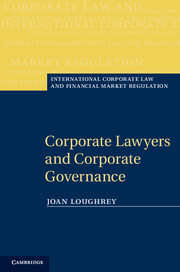Book contents
- Frontmatter
- Contents
- Preface
- Table of cases
- Table of statutes
- Table of statutory instruments
- International treaties
- List of abbreviations
- 1 Introduction
- 2 The international perspective
- 3 The roles of the corporate lawyer
- 4 Identifying the corporate client
- 5 The role of the corporate lawyer in intra-corporate litigation
- 6 The corporate lawyer as director
- 7 The regulation of the corporate lawyer
- 8 The case against reform
- 9 Reforming the role of the corporate lawyer
- 10 The reform of the legal profession and the role of the corporate lawyers
- 11 Conclusion
- Bibliography
- Index
3 - The roles of the corporate lawyer
Published online by Cambridge University Press: 07 October 2011
- Frontmatter
- Contents
- Preface
- Table of cases
- Table of statutes
- Table of statutory instruments
- International treaties
- List of abbreviations
- 1 Introduction
- 2 The international perspective
- 3 The roles of the corporate lawyer
- 4 Identifying the corporate client
- 5 The role of the corporate lawyer in intra-corporate litigation
- 6 The corporate lawyer as director
- 7 The regulation of the corporate lawyer
- 8 The case against reform
- 9 Reforming the role of the corporate lawyer
- 10 The reform of the legal profession and the role of the corporate lawyers
- 11 Conclusion
- Bibliography
- Index
Summary
Introduction
When, following the collapse of Enron, the SEC proposed that corporate lawyers should perform a whistle-blowing role by withdrawing from representing corporate clients where the clients did not respond appropriately to reports of misconduct, and notifying the SEC of the withdrawal, lawyers and their representative bodies responded with hostility. The Law Society argued that the SEC's proposals embodied ‘a false conception of the role of the lawyer. It is not a lawyer's job to correct or rectify the consequences of other people's illegal actions, or even to prevent wrongdoing.’ Seven of the United Kingdom's largest corporate law firms asserted that noisy withdrawal compromised ‘the core responsibility placed on an attorney that his or her loyalty is owed solely to the client, except in cases clearly involving severe, preventable consequences to third parties’. These responses either excluded or minimised the possibility that the profession had a broader public-service role. Yet this approach is at variance with traditional notions of professionalism which have incorporated the concept of public service. More recently, the City of London Law Society, which represents fifty-three City law firms, indicated that traditional public-interest regarding aspects of the lawyer's role, such as improving access to justice and increasing public understanding of the citizens' rights and duties were not relevant to their members' work, and offered instead a narrow vision of the public interest that comprised protecting the interests of their business clients.
- Type
- Chapter
- Information
- Corporate Lawyers and Corporate Governance , pp. 48 - 81Publisher: Cambridge University PressPrint publication year: 2011
- 1
- Cited by

